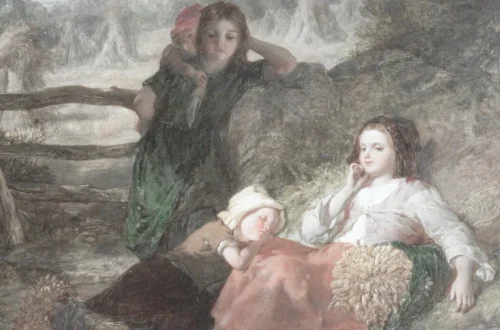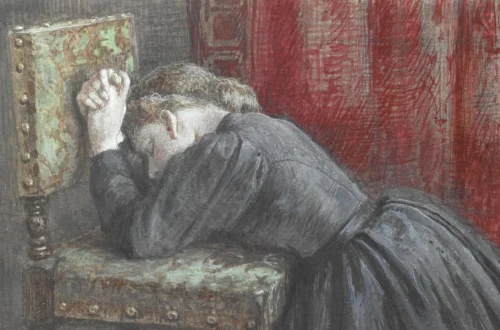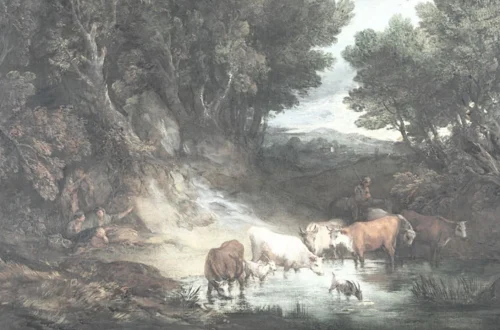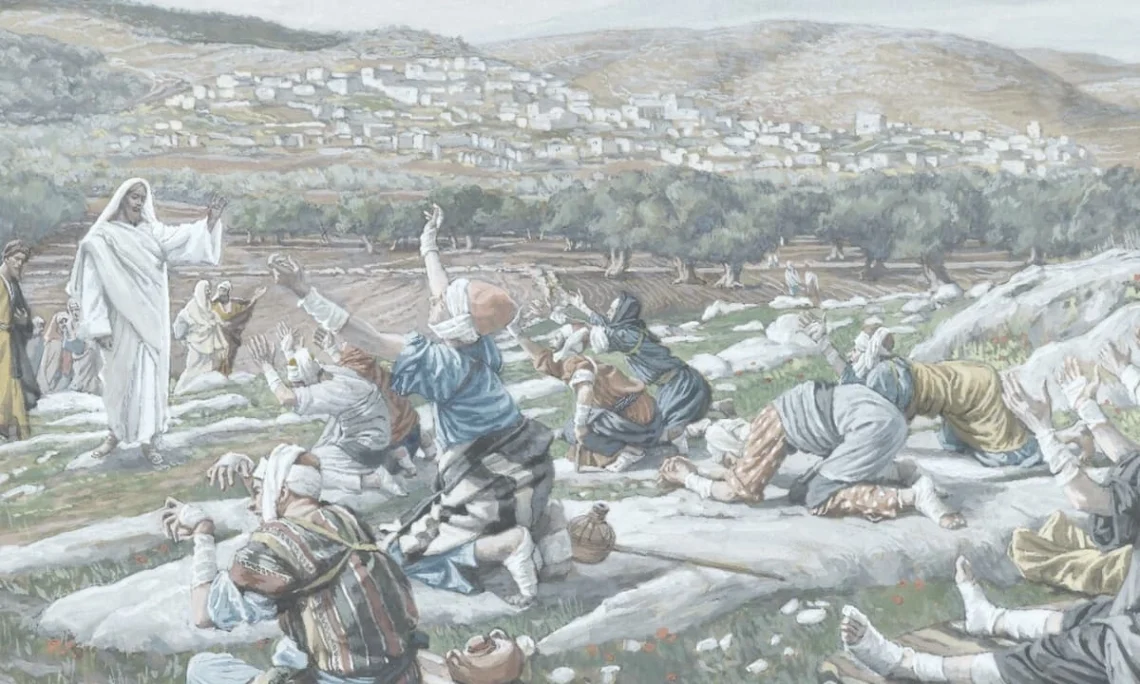
Lessons from Stories of Gratitude in the Bible
There’s something deeply grounding about the stories of gratitude in the Bible. They don’t just tell us what to do—they show us how people, real people, responded to God’s presence with thanks, often in situations that didn’t make sense. These stories aren’t always about comfort or blessings in abundance. Sometimes, they begin in barren places—waiting rooms, prison walls, aching hearts. Yet still, these individuals paused to express thanksgiving. It’s worth asking: why?
In everyday life, it’s easy to forget the power of thankfulness. The noise of obligations, disappointments, and just…life, can crowd out even the smallest moment of praise. But gratitude, especially biblical gratitude, isn’t about pretending things are fine. It’s about remembering that God is—even when life feels shaky. That shift? It changes things. That’s the transformative power of gratitude. It brings clarity. Strength. A strange peace that, if we’re honest, often surpasses what we understand.
Think of the story of Hannah. Her prayer didn’t begin with joy—it began with deep sorrow. But once she poured out her heart and later saw the blessings God gave, she responded not just with joy, but with a profound offering of thanks (1 Samuel 2). These scripture passages give us more than history; they offer a spiritual rhythm we’re invited to join. And maybe the Holy Spirit nudges us to remember this: a thankful heart isn’t a personality trait. It’s a choice. One we can make even in the hard places.
The Transformative Power of a Grateful Heart
Gratitude, when rooted in faith, becomes more than politeness or optimism—it becomes strength. In the Bible, thanksgiving is often woven into moments of deep spiritual awakening. It’s not just a response to good news, but a declaration of trust, even before the outcome is clear. That kind of gratitude—biblical gratitude—has the power to shift hearts and fortify weary souls.
The Apostle Paul, writing from prison, urged believers to “give thanks in all circumstances, for this is the will of God in Christ Jesus” (1 Thessalonians 5:18). That’s not easy. And yet, it reveals a truth: gratitude doesn’t erase pain, but it does reframe it. When we express gratitude in the thick of trial, we open our hearts to see beyond the present—to receive the blessings God still pours out, even quietly.
Spiritual strength is rarely loud. It grows in the quiet choice to say, “Thank You, Lord,” when life feels uncertain. This posture softens pride, deepens dependence, and aligns us with God’s heart. Gratitude is a gentle yet powerful tool. One that makes space for peace. One that reminds us we’re not walking alone.
A Thankful Heart at the Red Sea
Few moments in the Bible capture raw relief and radiant praise like Israel’s deliverance at the Red Sea. One day, they stood trapped—Egyptian army behind them, endless water ahead. And then, impossibly, the waters parted. It’s the kind of scene we can hardly picture without awe.
But what’s remarkable isn’t just the miracle. It’s what came after. Moses didn’t rush ahead to the next crisis. He stopped. He sang. In Exodus 15, we see one of the earliest recorded songs of praise in Scripture—a biblical story of spontaneous, public gratitude. Miriam joined with a tambourine, leading the women in celebration. Their joy echoed across the dry shorelines. They didn’t just survive. They worshiped.
This great story isn’t only about rescue—it’s about remembering. Because the Red Sea wouldn’t be the last obstacle. But praise anchored them in God’s faithfulness. That moment became a spiritual marker: the God who saved us then will save us again.
Too often, we move on quickly from answered prayers. But maybe what this scripture passage is saying is simple: don’t rush past the moment. Stop. Sing. Let your thankful heart speak before the next chapter begins.
Hannah’s Story: Gratitude Through Waiting and Prayer
The story of Hannah is one of aching silence and persistent faith. Long before her son Samuel was born, Hannah lived with longing. Her prayer wasn’t rushed. It came from a place of deep distress, year after year. And yet, she didn’t let bitterness take root. Instead, she poured her heart out to the Lord, believing that He heard her—even in her waiting.
What’s striking isn’t just the answer to her prayer, but Hannah’s prayer of thanks afterward (1 Samuel 2). She could have kept Samuel close. He was, after all, the answer to years of pain. But her gratitude ran deeper than the gift—her thankfulness was to the Giver. She gave Samuel back to God, showing deep gratitude wrapped in surrender.
Expressing thanksgiving before and after an answer is a rare kind of trust. Hannah teaches us not only how to pray through our pain but how to rejoice with open hands. Her life reminds us that gratitude isn’t about getting what we want. It’s about trusting God’s plan, even when it unfolds slowly.
David’s Psalms: Singing Gratitude in the Valleys
King David’s life was full of contradictions—triumph and trouble, praise and pleading. Yet in the Psalms, we see a thread that holds everything together: a song of thanks. Whether he was running from enemies or ruling a kingdom, David returned again and again to gratitude.
Psalm 28, Psalm 30, Psalm 138—each one carries the heartbeat of someone who believed in God’s faithfulness, even when his circumstances were anything but easy. David’s thankfulness wasn’t shallow. He named his fears. He confessed sin. He wept and worshipped in the same breath. That’s what makes his words so enduring—they’re honest.
And still, in the valleys, David chose to lift his voice. He understood something profound: that singing praise isn’t just a celebration—it’s a sacred act of trust. When we sing to God from our fragile places, we’re proclaiming who He is, even when we don’t see the outcome.
We also catch this spirit in the songs of praise from Moses and Miriam (Exodus 15), after walking through the Red Sea with the Egyptian army behind them. Their voices rose in gratitude—not just for safety, but for the undeniable proof that God had moved. Their praise was public, powerful, and a beautiful expression of gratitude. It reminds us: when God shows up, we celebrate out loud.
The Thankful Leper: Noticing Grace Others Miss
In Luke 17, we find a quiet but striking Bible story—ten lepers healed, and yet only one returns to give thanks. It’s a moment easy to pass over, but it says so much about how we notice (or overlook) God’s blessings in our own lives.
The lepers had cried out to Jesus Christ, desperate for mercy. And mercy was given. But only one—a Samaritan, the outsider—turned back. He fell at Jesus’ feet, praising God in a loud voice. His heart recognized something the others missed. And Jesus’ response? “Were not all ten cleansed? Where are the other nine?” (Luke 17:17, Bible verse).
Gratitude doesn’t always come naturally. Sometimes, we rush forward with relief, forgetting the Giver in the glow of the gift. But this leper reminds us that expressing gratitude isn’t a formality. It’s a sacred act. One that honors not only the gift, but the Giver Himself. In a world quick to move on, a thankful heart stops, notices grace, and turns back.
Mary’s Song: The Mother of Jesus and Her Grateful Spirit
Of all the Bible stories that illustrate deep and humble thankfulness, Mary’s song in Luke 1 stands among the most beautiful. A young woman, likely scared and uncertain, doesn’t protest or retreat. Instead, she sings.
Her “Magnificat” isn’t just poetic. It’s a bold expression of gratitude—a response to the God’s blessings she didn’t expect, and could hardly understand. “My soul magnifies the Lord, and my spirit rejoices in God my Savior…” (Luke 1:46–47). In that Bible verse, we see no fear—just deep, joyful surrender.
Mary knew she was stepping into mystery. Her life was about to change in unimaginable ways. Still, she praised. She trusted the will of God, even without knowing what each day would hold. And that is why she’s one of the most enduring examples of people who chose a grateful heart in the face of uncertainty.
Mary’s song teaches us that gratitude isn’t always loud or perfect. Sometimes, it’s a whispered yes in the middle of the unknown. A quiet “thank you, Lord” when plans fall apart. Her story invites us to embrace joy in God’s plan—even before we see how it unfolds.
The Story of Jonah: Learning Gratitude in Unexpected Places
Jonah’s story isn’t usually the first one we turn to when we think of gratitude. It’s more about running away, resisting, wrestling with God’s plan. And yet—there, in the belly of a great fish, we find one of the most unexpected stories of gratitude in the Bible. His prayer in Jonah 2 doesn’t begin with complaint. It begins with thanksgiving: “But I, with shouts of grateful praise, will sacrifice to you” (Jonah 2:9).
It’s a surprising story of gratitude, because it happens in a dark, smelly, and seemingly hopeless place. But perhaps that’s the point. Sometimes, we don’t learn deep gratitude when everything is going well—we learn it in the detours, in the places we never planned to be. When everything is stripped away, gratitude isn’t about circumstances. It’s about acknowledging God’s mercy, His patience, His pursuit.
God uses these “fish-belly seasons” to reshape our attitude of gratitude. Jonah’s circumstances didn’t instantly change, but his heart did. And that shift—learning to express thanksgiving right in the middle of discomfort—can be the beginning of something holy. Gratitude, after all, doesn’t require escape. Sometimes it begins with surrender right where you are.
Gratitude in the Lion’s Den: Daniel’s Daily Devotion
In the book of Daniel, we see a remarkable picture of steadfast thankfulness—not once, but daily. Even when his life was on the line, Daniel didn’t panic or hide. He opened his windows, knelt down, and gave thanks to God, just as he had done before (Daniel 6:10). That’s a biblical example of gratitude woven into ordinary routine.
His habit of prayer and thanksgiving wasn’t dramatic. It was consistent. This wasn’t about a big emotional moment—it was about rhythm. A rhythm that sustained him when the stakes were terrifying. Even when King Darius signed the decree that made prayer a crime, Daniel didn’t change his practice. Gratitude wasn’t reactive—it was a way of life.
And then came the lion’s den. No panic. No public protest. Just trust. Gratitude had prepared him for the crisis. It had shaped his view of God’s faithfulness. The miracle wasn’t only that the lions’ mouths were shut, but that Daniel went in with peace. Maybe that’s one of the gifts of regular gratitude—it trains our hearts to remain steady in the storm.
Gratitude, even when it’s quiet and unnoticed, builds a foundation. Daniel’s story shows us the powerful impact of being faithful with the small, sacred habits. And how those habits sustain us through the hardest nights.
Job’s Surrender: Trusting God’s Goodness in the Dark
Few Bible stories carry as much raw weight as the story of Job. Loss after loss, pain upon pain. And yet, his first response? “The Lord gave and the Lord has taken away; blessed be the name of the Lord” (Job 1:21). It wasn’t pretty or polished—but it was worship. It was gratitude through tears.
This is the kind of gratitude that doesn’t wait for clarity or comfort. It chooses to say “God is still good” even when nothing makes sense. When the world crumbles. When prayers feel unanswered. When your heart is shattered and the healing is slow.
Gratitude in difficult times isn’t about denying the pain—it’s about refusing to let the pain have the final word. Job’s story shows us a heart that, even in confusion, turned toward God instead of away. He didn’t hide his questions or his grief, but he still bowed in reverence.
This is the transformative power of gratitude. It teaches us to trust that even in the darkest places, God is near. That He sees, He knows, and He holds every tear. And sometimes, the deepest gratitude grows not after the pain is gone—but right in the middle of it.
Paul and Silas in Prison: Songs That Shook the Earth
It’s one of the most unexpected scenes in the New Testament—two beaten, bruised men, sitting in a prison cell, singing. Paul and Silas had been unjustly arrested, chained, and thrown into the inner cell. The air must have been damp. The silence, thick. And yet, they sang. Not quietly, not privately—but loud enough that the other prisoners heard.
Then something remarkable happened. A violent earthquake shook the foundation of the prison, opening every door and breaking every chain. But the real miracle? Paul and Silas stayed. Their songs of praise had shifted more than stone and iron; they softened hearts, including that of the jailer.
The apostle Paul didn’t wait for his release to give thanks. He worshiped in the middle of the storm. This wasn’t optimism—it was deep, grounded trust. A powerful impact, born not from comfort but from communion. From knowing that God’s presence was greater than the pain. And maybe that’s the reminder for us: we don’t need perfect conditions to praise. Sometimes, the darkest cell becomes the most sacred sanctuary when gratitude is lifted in song.
King Jehoshaphat’s Choir: Leading with Praise, Not Panic
Imagine standing on the battlefield, not with weapons, but with voices. That’s exactly what King Jehoshaphat did. Faced with a vast enemy army, he didn’t call for warriors first—he appointed singers. A great story, and frankly, a surprising one.
They sang praises to the steadfast love of the Lord (2 Chronicles 20:21) before the victory came. It was an act of trust. A declaration: “We believe God’s promises more than we fear this threat.” This wasn’t spiritual denial. It was biblical time-tested trust in God’s Word. The people chose worship over worry, praise over panic.
And God responded. Confusion spread through the enemy camp, and the battle was won without a sword lifted. That’s the quiet boldness of biblical figures—they knew how to give thanks before the breakthrough.
It’s easy to be grateful when the dust settles and we’ve made it through. But giving thanks before the battle is over? That’s a different kind of courage. And maybe that’s what we’re being invited into: not to pretend we’re not afraid, but to sing anyway. To lead with praise and let God handle the outcome.
The Sinful Woman: Gratitude Expressed in Action
She didn’t say a word. She didn’t offer a sermon or quote a psalm. She wept. She poured perfume. She knelt at Jesus Christ’s feet and wiped them with her hair. In a room filled with judgment, this woman’s story has become a living picture of gratitude that moves.
Luke 7 tells us this moment wasn’t about spectacle. It was about deep gratitude—the kind that flows from a forgiven heart. She knew how much she had been loved. She had encountered grace so unexpected, it overflowed into costly worship. Her actions were bold, uncomfortable even, but undeniably sincere.
This story of gratitude reminds us that expressions of gratitude don’t always come in tidy words. Sometimes, it’s in how we serve. How we love. How we pour ourselves out for others. And it challenges us to ask: is our gratitude merely spoken, or is it lived?
To this day, Jesus’ words echo: “Her many sins have been forgiven—as her great love has shown” (Luke 7:47). A thankful heart is not a passive thing. It breaks open alabaster jars. It shows up, even when the world watches. It loves back with everything it has.
If you’ve been longing to deepen your walk with God but don’t know where to start, you’ll love How to Get Closer to God: A Step-by-Step Biblical Guide. It offers gentle practices and Scripture-based rhythms to nurture intimacy with Him in everyday life.
Surprising Stories of Gratitude You Might Have Missed
Some of the most tender expressions of gratitude in the Bible are tucked away in moments you might overlook at first glance. These aren’t always grand scenes of celebration. Sometimes they’re quiet, almost hidden—yet they carry a powerful example of what it means to have a heart of gratitude.
Take Mary’s gratitude in Luke 1. Her response to the angel’s news wasn’t fear or doubt, though she surely felt both. It was worship. Her Magnificat—a song of deep thanks—flows not from certainty, but trust. Then there’s the sinful woman in Luke 7, who anointed Jesus’ feet. Her tears, her silence, her offering of perfume—each action whispered a thankfulness that words couldn’t contain.
These lesser-known stories of gratitude remind us that thanksgiving doesn’t always come with a trumpet sound. Sometimes it looks like a quiet pause at the end of the day. Or a whispered prayer when the news wasn’t what you hoped. Gratitude in Scripture isn’t always logical, but it’s always sincere. And somehow, those small moments become unforgettable in the eyes of heaven.
Practical Lessons from Every Story
The Bible doesn’t just present stories for us to admire—it offers them so we can learn how to live. And if these bible verses and examples of gratitude teach us anything, it’s that thanksgiving is deeply woven into the life of faith.
A life of gratitude doesn’t require perfect circumstances. Most of these biblical figures weren’t giving thanks on mountaintops—they were in valleys, waiting rooms, or in the middle of messy lives. Their stories reveal something crucial: the importance of gratitude isn’t about ignoring pain; it’s about recognizing God’s presence in it.
So how can you express gratitude in your everyday life? Perhaps it begins with noticing. The warm coffee. A child’s giggle. A verse that suddenly speaks to your soul. Let your response be simple: “Thank You, Lord.” Not because everything is fixed, but because He’s still faithful.
And maybe the hardest, most courageous step is this: choosing to give thanks in both joy and pain. That choice doesn’t come easy. But each time you make it, your heart is reshaped—slowly, quietly—into one that reflects the goodness of the One you’re thanking.
The Life-Changing Invitation of Biblical Gratitude
Gratitude, in its truest form, has a way of shifting your entire vision. When you live with a heart attuned to giving thanks, you begin to see God’s faithfulness in places you once missed. You recognize His hand in both the ordinary and the sacred. Gratitude doesn’t change your circumstances—but it does change how you move through them.
Letting gratitude shape how you see God, yourself, and others isn’t about being cheerful all the time. It’s about anchoring your soul to what is still true, even when life is hard. That He is good. That you are held. That nothing is wasted in His plan.
So as you close this page, maybe pause. Ask yourself: What is one small thing I can thank God for today? Begin there. Let that small prayer of thanks open a new chapter—a new story—of biblical gratitude in your own life.
PIN ME FOR LATER!
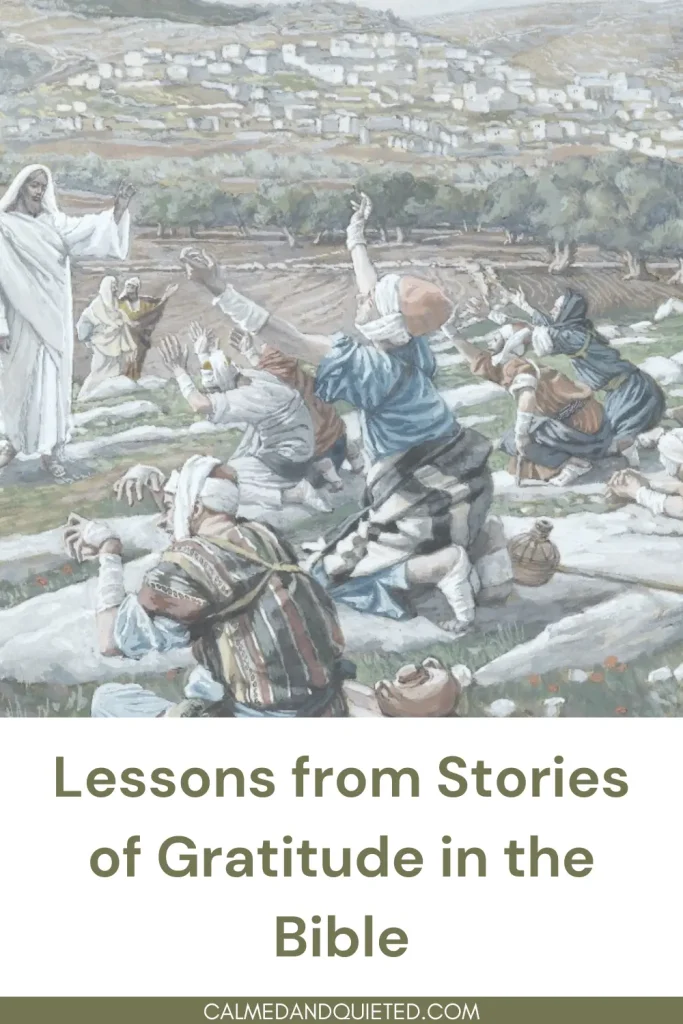
What story of gratitude in the Bible has shaped your view of thankfulness? Share in the comments below—your story might encourage someone else today.


